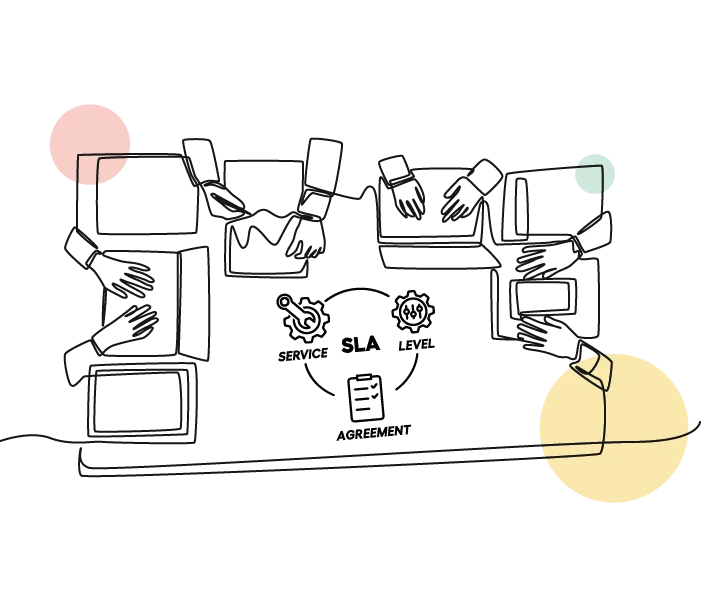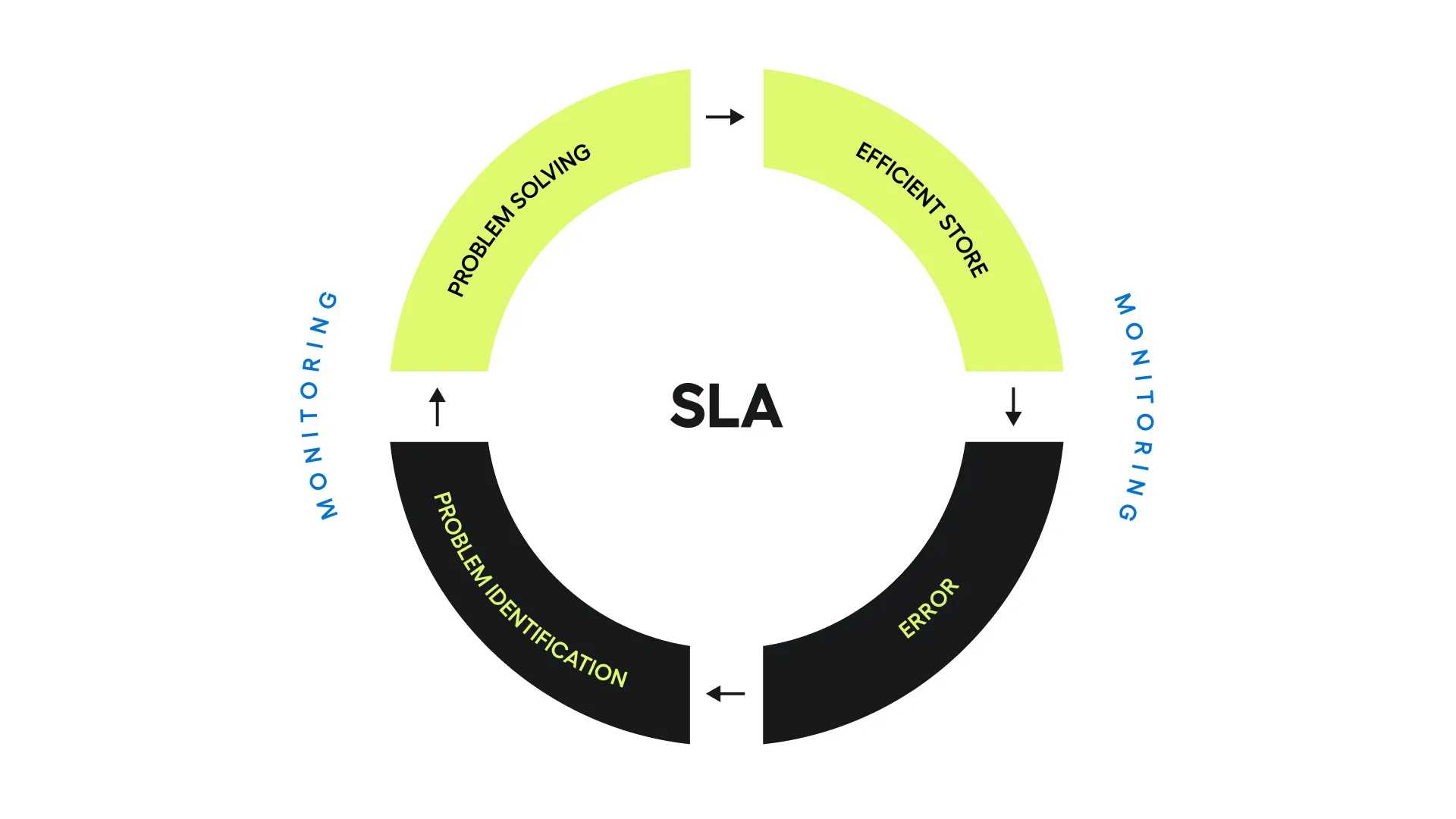

Service Level Agreement
SLA Agreement - ensuring
seamless operation
of your online store
An SLA is a contract between a software house and an online store representative to ensure the store's continuous operation. It specifies response times and resolution methods in case of failures, guaranteeing maximum platform stability.
Service Level Agreement - what is it about and why do you need it?
Running an online store involves numerous factors that can disrupt its smooth operation. Platform failures and errors can hinder or even halt sales, lowering customer satisfaction and harming your reputation. While these incidents can't be completely eliminated, an SLA helps minimise their negative impact.
An SLA (Service Level Agreement) is a contract that guarantees a specific level of service. It sets performance standards you can expect from the service provider, such as platform availability, response times to issues, and maximum downtime duration. This ensures the highest quality of operation and optimal conditions for successful sales.

Why your store can't operate without an SLA?
Running an online business requires managing various areas simultaneously, from inventory control to customer service. What's more, just spotting a problem doesn't end there. The most important thing is to solve it quickly and restore proper operation of the store. This is where we and the SLA come to the rescue. Learn all the benefits of its conclusion!

defined levels of availability and response time minimise downtime and failures, reducing their impact on your e-store.

problems are identified and resolved in the shortest possible time, which guarantees high availability and stability of the platform, even in emergency situations.

eliminating potential threats and preventing failures enables smooth platform operation, even during unforeseen events.

the ability to efficiently place orders at any time translates to positive customer experiences and builds loyalty to your brand.

the SLA also includes strict security guidelines, ensuring that the e-store is protected from threats such as cyber-attacks.

Service Level Agreement clearly defines performance metrics, allowing you to monitor service delivery and meet business objectives.
Quality guaranteed - what does a well-structured SLA look like?
What are the characteristics of a good SLA that allows you to sell online without worrying about downtime and unnecessary frustration for your customers? First of all, it's a precisely and clearly defined description and scope of services offered, but not only that. It's also a lot of other important details, such as: quality indicators, definitions of errors or penalties for delays - all established based on individual requirements. Check out what an SLA tailored to your eCommerce business should contain.
01/Response time
Quick response and clear timeframes for repairing defects are the key to maintaining high eCommerce availability. Therefore, we pay special attention to this aspect of the contract, which is a guarantee of uninterrupted operation.
02/Types of errors
A good contract is one in which the parties are confident that they understand each other. To achieve this, it is important to define key terms, such as types of errors. This makes it possible to avoid misunderstandings.
03/Maintenance costs
The costs associated with the SLA include an SLA subscription, which ensures continuous monitoring and the team's readiness to act in case of failures. Repair work is billed at a predetermined hourly rate.
04/Failure reporting procedure
Responsibility for failures includes the consequences associated with failure to repair problems in a timely manner. Therefore, we clearly establish the extent of penalties (e.g., in the form of financial or additional developer hours) for any delays.
05/Procedura zgłaszania awarii
A well-defined failure reporting procedure and a dedicated contact number ensure a quick response to technical issues. This way, both parties know how to effectively manage incidents.
06/Quality Indicators
Quality indicators provide measurable criteria for evaluating the SLA services. Monitoring these indicators allows for continuous process improvement, ensuring high service quality and identifying areas that need improvement.
SLA in practice - how do we ensure the highest quality for your online store?
An SLA is a solid foundation for the reliability of your online store. While the agreement sets the framework, we tailor its final form and execution to your individual needs and the specifics of your business. This way, we can provide you with the highest quality of service regardless of the size of your eCommerce, the industry you operate in, or the number of customers you serve. Discover the step-by-step process of how it is implemented.
And when you need simple answers to important questions…
An SLA must be tailored to the specific needs of each online store, so there is no universal template. It is crucial to precisely define the level of service, methods of measurement, and procedures in case standards are not met. Additionally, the agreement should be flexible to adapt to changing business needs.
It is also important to specify the duration of the agreement and the conditions for its modification. This ensures the SLA is appropriately tailored to the needs of the online store, providing effective protection and high-quality services.
An SLA package consists of two parts: a fixed fee for platform maintenance and the cost of repairing specific failures based on the developer hours needed to fix the issue. Additionally, the package may include various levels of responsibility, often measured in the number of hours and days of the week (e.g., 24/7 or 12/5) that the support team is available. The choice of a specific type depends on the individual needs of the store and the available budget. If the online store requires continuous care and quick response to potential problems, a 24/7 SLA support package may be beneficial. For smaller stores or those with fewer transactions, a package offering partial weekly coverage may be sufficient.
To ensure you choose the best solution, it's worth consulting with a specialist who understands the nature of your business and can recommend the best package.
When entering into an SLA, it's important to remember that it is not a tool that provides full protection against all potential technical problems or failures. It is a tool to minimise risk and ensure the appropriate quality of services (but not an absolute guarantee of flawless operation). As the name suggests, it guarantees protection only at a specified service level. Depending on the individual agreements, it may not include, for example, implementing new solutions or fixing errors resulting from unforeseeable events.
Such results can be achieved by other types of agreements, such as maintenance contracts or development agreements. A maintenance contract typically includes a monthly package of hours that offers both ongoing support and development.
While you might hear that "warranty" and "SLA" are used interchangeably, it's important to understand that they refer to two different agreements, thus guaranteeing different results. A warranty typically ensures the correct operation of the platform (including repair of any defects if necessary) for a period after project completion (e.g., 12 months). An SLA, on the other hand, offers greater flexibility in terms of both duration and the range of services provided, including availability levels, response times, and procedures in the event of failures.
When entering into an SLA in the IT field, it's essential to consider several key issues. First, clearly define the terms of the agreement (response times, failure response procedures, and responsibility for delays). Second, to ensure the agreement is professionally and comprehensively executed, choose an experienced software house. At Advox, we have been working in the eCommerce industry for over 15 years, meeting the needs of various online businesses (our portfolio includes B2B and B2C projects for both Polish and international clients). Over the years, we have not only developed our own working style that takes into account the specifics of the industry but also built a team that will handle every area of your online store.
Ensure your store only surprises you positively
Tailor the SLA to your business needs!









